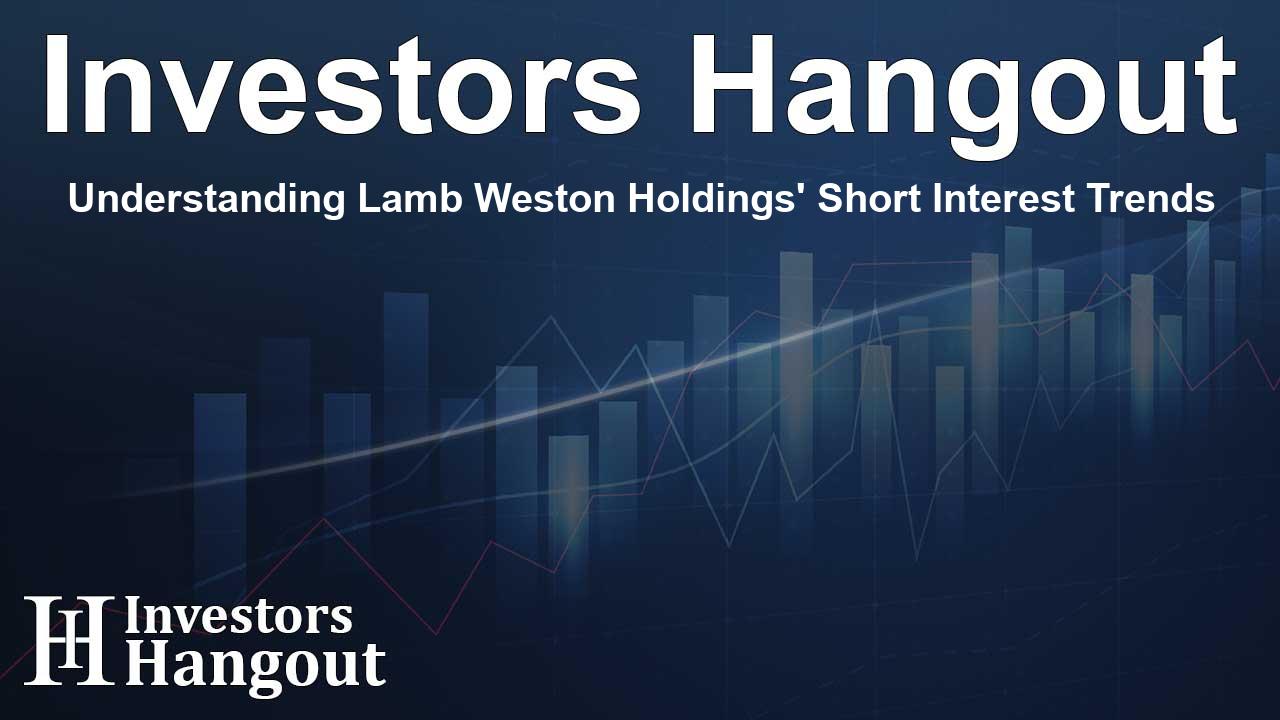Understanding Lamb Weston Holdings' Short Interest Trends

Understanding Lamb Weston Holdings' Short Interest Trends
Lamb Weston Hldgs (NYSE: LW) has seen a notable decline in its short percent of float, dropping by 10.02% since the latest report. The data reveals that there are approximately 6.24 million shares sold short, constituting 4.94% of all available regular shares for trading. Analysts indicate that, given the current trading volume, it would take about 3.35 days on average for traders to cover their short positions.
Significance of Short Interest in the Market
Short interest represents the total number of shares sold short that have yet to be repurchased or covered. Essentially, short selling allows traders to profit by betting against a stock, hoping its price will decline. If the price does drop, those traders can buy back the shares at a lower value and pocket the difference. Conversely, if the stock price increases, the traders incur losses, thus making this strategy risky.
Market Sentiment and Short Interest
Monitoring short interest is crucial for investors because it serves as a barometer for market sentiment. A rise in short interest often indicates a bearish outlook amongst investors, suggesting that they anticipate a further decline in the stock's price. Alternatively, a decrease in short interest may signal a bullish sentiment, implying that investors are becoming more optimistic about the stock's performance.
Recent Trends in Lamb Weston Hldgs' Short Selling Activity
The recent reports indicate a downward trend in the number of shares sold short for Lamb Weston Hldgs. While this reduction does not guarantee a price increase in the immediate future, it is essential for traders to take note of this shift in short interest. The declining trend may suggest a change in trader confidence regarding the stock's upcoming performance.
Short Interest Comparison with Industry Peers
Comparing Lamb Weston Hldgs' short interest to its peers is an effective way to assess its market standing. Investors utilize peer comparison to analyze how a company is performing within its industry. Peers typically share similar characteristics, including industry type, company size, age, and financial structures.
Based on recent data from analysts, the average short interest as a percentage of float within Lamb Weston Hldgs' peer group is 4.43%. This statistic indicates that Lamb Weston has higher short interest than many of its competitors, underscoring possible investor concerns or expectations regarding its market performance.
How Increased Short Interest Can Indicate Potential
Interestingly, rising short interest can sometimes point towards a bullish opportunity for stocks. In certain market scenarios, increasing short positions could potentially lead to a short squeeze. This occurs when a heavily shorted stock's price begins to rise unexpectedly, forcing short sellers to buy back shares to cover their positions, which can further drive the price up.
Understanding the Market Dynamics for Lamb Weston Hldgs
Engaging with the current short interest dynamics for Lamb Weston Hldgs provides invaluable insight into market behavior. By understanding the implications of both increases and decreases in short selling activity, investors can better navigate the complexities of the trading landscape.
Frequently Asked Questions
What is short interest?
Short interest refers to the total number of shares that have been sold short but not yet covered. It is a measure of market sentiment regarding a security.
How does short selling work?
Short selling involves selling shares that a trader does not own, with the aim of buying them back at a lower price after the stock's value drops.
Why is Lamb Weston Hldgs' short interest declining?
A decrease in short interest could imply improved market sentiment toward Lamb Weston Hldgs, suggesting that investors are feeling more optimistic about its future performance.
What does it mean if short interest is high compared to peers?
High short interest relative to peers may indicate that investors are more pessimistic about the company compared to its competitors, pointing to potential market concerns.
Can increasing short interest be a good sign?
Yes, in some cases, rising short interest can signal a potential short squeeze opportunity, which may lead to an increase in the stock price as short sellers rush to cover their positions.
About Investors Hangout
Investors Hangout is a leading online stock forum for financial discussion and learning, offering a wide range of free tools and resources. It draws in traders of all levels, who exchange market knowledge, investigate trading tactics, and keep an eye on industry developments in real time. Featuring financial articles, stock message boards, quotes, charts, company profiles, and live news updates. Through cooperative learning and a wealth of informational resources, it helps users from novices creating their first portfolios to experts honing their techniques. Join Investors Hangout today: https://investorshangout.com/
Disclaimer: The content of this article is solely for general informational purposes only; it does not represent legal, financial, or investment advice. Investors Hangout does not offer financial advice; the author is not a licensed financial advisor. Consult a qualified advisor before making any financial or investment decisions based on this article. The author's interpretation of publicly available data shapes the opinions presented here; as a result, they should not be taken as advice to purchase, sell, or hold any securities mentioned or any other investments. The author does not guarantee the accuracy, completeness, or timeliness of any material, providing it "as is." Information and market conditions may change; past performance is not indicative of future outcomes. If any of the material offered here is inaccurate, please contact us for corrections.